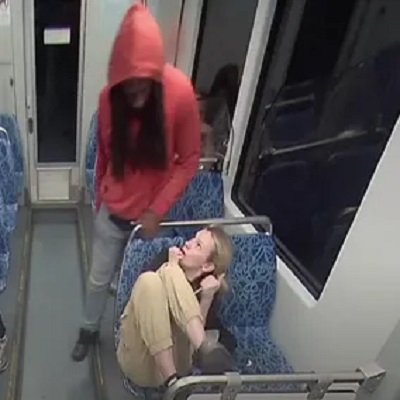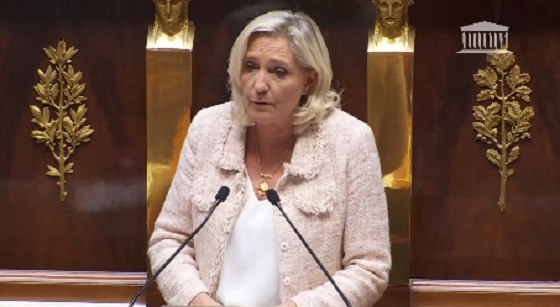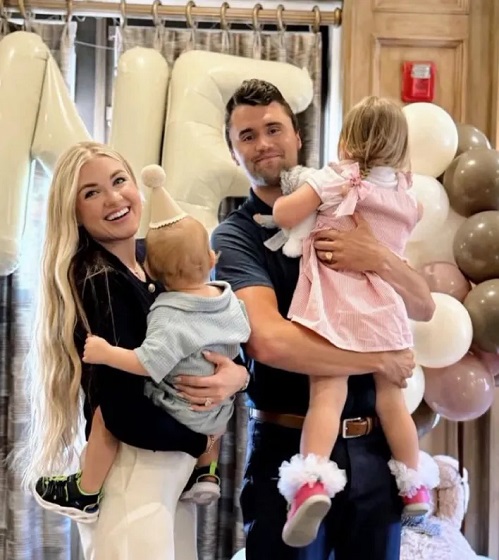COVID-19
BC Conservative leader regrets getting COVID shots, says mandates were about control
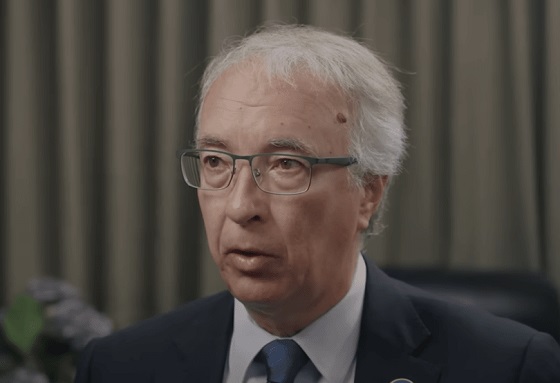
From LifeSiteNews
‘I’ve had three shots of the vaccine. I wish I hadn’t, quite frankly,’ B.C. Conservative leader John Rustad said in a recently resurfaced video.
Footage of British Columbia Conservative leader and premier hopeful John Rustad shows him saying he regrets taking the experimental COVID-19 vaccines and thinks government mandates were aimed at controlling the population.
In an interview, recorded in June but publicized September 23 by Rustad’s political rival, the New Democratic Party (NDP), in a seeming attempt to smear him, the B.C. Conservative leader explained that he regrets taking the COVID vaccines and that mandates instituted in the province at the time weren’t about health, but control.
“I’ve had three shots of the vaccine. I wish I hadn’t, quite frankly,” Rustad said.
“That’s one of the things that has changed in my thinking. The so-called vaccine, the COVID mRNA shots,” he said, recalling a conversation with B.C. Provincial Health Officer Dr. Bonnie Henry.
Rustad said the conversation with Henry left him feeling that something wasn’t “quite right.”
“When I talked to Bonnie Henry about it, I started to realize that it wasn’t so much about trying to get herd immunity or trying to stop the spread, but it was more around shaping opinion and control on the population,” Rustad said.
In July of this year, John Rustad met with an anti-vax group that is suing Dr. Bonnie Henry.
He said he regrets getting “the so-called vaccine” and accuses Dr. Henry of using it for “control on the population.” pic.twitter.com/m2h3IHAyK0
— BC NDP (@bcndp) September 23, 2024
Henry became infamous in B.C. thanks to her vaccine policy which prevented unvaccinated health care workers from working for nearly three years.
Finally, in July of this year, Henry announced that the province is no longer in a public health emergency and is revoking all COVID regulations, including the vaccine mandate.
The decision came as a surprise after Henry had seemed determined to keep British Columbia’s vaccine mandate regardless of the hundreds of health care workers who had been unable to work since 2021 despite the ongoing worker shortage in the sector.
In May, Henry’s mandate was challenged in court. The judge ruled that healthcare workers can still be mandated to receive the experimental COVID injections as a condition of employment, but decided that those working remotely are no longer bound by the unscientific rule.
Hundreds of British Columbia healthcare workers are still suing Henry over the mandate which prevented them from working.
While Rustad’s comments condemning Henry were made during a July 23 interview with the B.C. Public Service Employees for Freedom which opposes vaccine mandates, the resurfacing of the footage by the NDP ahead of the provincial election this fall seems to suggest the far-left party assumed Rustad’s comments would paint him in a bad light.
However, the video seems to have had the opposite effect, as many online pointed to the video as a reason to vote for Rustad.
” Y’all don’t realize this will help Rustad’s campaign lol,” pro-freedom nurse Amy Hamm commented.
Y’all don’t realize this will help Rustad’s campaign lol
— Amy Eileen Hamm (@preta_6) September 23, 2024
“This isn’t the win you think it is,” another wrote. “Lots of people regret getting the #Covid_19 ‘vaccines.’ They prevented neither infection nor transmission and your ‘vaccine’ did not ‘keep others safe’ no matter how much you want to believe it.”
This isn’t the win you think it is.
Lots of people regret getting the #Covid_19 “vaccines”
They prevented neither infection nor transmission and your “vaccine” did not “keep others safe” no matter how much you want to believe it.
The market for these products has crashed.…
— Karl Harrison (@KarlDHarrison) September 23, 2024
COVID-19
Why FDA Was Right To Say No To COVID-19 Vaccines For Healthy Kids
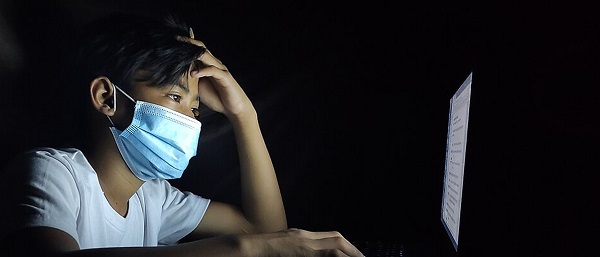

From the Daily Caller News Foundation
The FDA’s decision not to authorize COVID-19 vaccines for healthy children has drawn criticism. Some argue: If parents want the shot, why not let them get it for their kids? That argument misunderstands what FDA authorization means — and why it exists.
The FDA often approves drugs that carry risks or have imperfect evidence of effectiveness. This is a tradeoff we sometimes accept for people who are ill: when someone is already sick, the alternative is untreated disease. Vaccines are different. They are given to millions of healthy children. This requires a higher standard, not just evidence for safety and immune response, but clear, durable clinical effectiveness. Approval for optional use isn’t neutral; once the FDA authorizes a vaccine, it carries the full weight of institutional endorsement.
Measles provides an example for how the FDA approaches vaccine approvals. Before the measles vaccine was introduced in 1963, the U.S. saw 3 to 4 million infections, ~48,000 hospitalizations, ~1,000 cases of encephalitis, and 400-500 deaths each year. Infants bore the brunt of the most severe outcomes.
Dear Readers:
As a nonprofit, we are dependent on the generosity of our readers.
Please consider making a small donation of any amount here.
Thank you!
That created a natural instinct: why not vaccinate the youngest and most vulnerable? The initial measles rollout was to 9-month-olds, but within two years that timing was changed to children who were at least 1 year of age. This was not because younger babies were not at risk or that the vaccine was riskier for them, but because it just didn’t work well enough to justify a universal campaign.
The knowledge of the particular risk younger infants face has led to continued research on the effectiveness of measles vaccination in that group. A 2023 trial of the combined measles/mumps/rubella (MMR) vaccine in infants aged 5-7 months, and subsequent safety and immune studies in 2024 and 2025, produced consistent results—safety and the ability to generate antibodies were demonstrated, but a durable response and protection against hospitalization were not.
That is why the FDA does not approve MMR for routine use in healthy children younger than 12 months of age. It is also precisely why getting back to herd immunity for measles is so essential: the youngest infants can only be protected if the rest of us are immunized.
What’s the evidence for COVID-19 vaccination in infants and children? It generates robust antibodies, often higher than in adults. But clinical benefits are modest, short-lived, and inconsistent. It is nowhere near the level of proof U.S. regulators require before making a vaccine universally available to healthy kids.
Some argue that even if benefits are modest, parents and pediatricians should be free to choose. But FDA authorization is not about personal preference; it is a stamp of approval for more than 70 million healthy children. Statistical safety is not enough. At that scale, even rare risks mean real harm to real children. COVID-19 vaccines were originally authorized in the hope that immune responses would translate into population-level benefits. For healthy children, the initial optimism sparked by early encouraging signals has steadily given way to three years of disappointing clinical results.
The lessons from measles are clear: safe but minimally effective isn’t enough. We don’t authorize MMR for 5-month-olds, even to parents who might want their children to get it. COVID-19 vaccines for healthy children should be judged similarly. This is not because there is a lack of any benefit, but because it doesn’t rise to the level we use for other vaccines. Only if and when proof of clinical effectiveness becomes available should authorization be reconsidered. At this time, the FDA is right to say no.
Monique Yohanan, MD, MPH, is a senior fellow at Independent Women, a physician executive and healthcare innovation leader, and Chief Medical Officer at Adia Health.
COVID-19
The Persecution of Canada’s “Other” Freedom Convoy Truckers
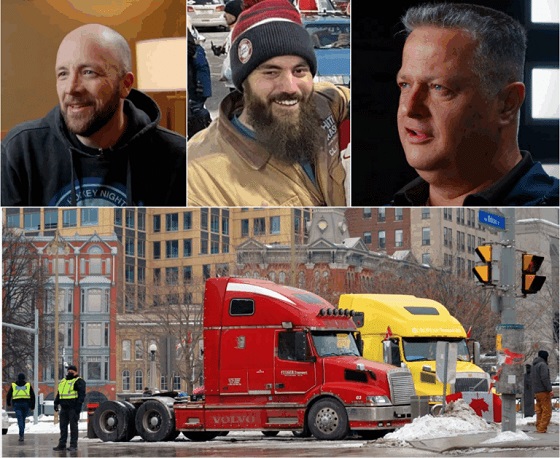
While thousands of serious criminal cases across Canada are dropped merely due to delays, many Convoy-related prosecutions on trivial charges continue more than three-and-a-half years later. The cases of Freedom Convoy truckers (left to right) Bern Bueckert, Clayton McAllister and Csaba Vizi (whose Volvo is shown at bottom) are still not fully resolved. (Sources of photos: (top left and right) screenshots from documentary Unacceptable?; (top middle) ThankYouTruckers.Substack; (bottom) Donna Laframboise)
On September 8, three and a half years after the 2022 Freedom Convoy departed Ottawa, and five long, stressful months after his trial actually ended, Robert Dinel walked out of court a free man.
Dinel, a Quebec heavy equipment operator who’d behaved entirely peacefully during the protest over Covid restrictions, had been charged with mischief and obstruction of police. Court proceedings were repeatedly delayed — four times alone just this year — until judge Matthew Webber of the Ontario Court of Justice finally stayed the charges on the grounds that Dinel’s Charter rights to a timely trial had been violated.
For Dinel, it was a relief. For Canadians concerned about freedom and justice, his legal ordeal was yet another example of a system gone off the rails.
Most Canadians are aware of the trials of convoy leaders Tamara Lich and Chris Barber, which ended in conviction; they are to be sentenced in October. Few may realize that many more protestors were charged, most for the relatively innocuous infraction of mischief, and have had their cases drag on and on through the courts for more than three years.
The record of Canada’s legal system clearly shows that mischief charges are routinely withdrawn before scarce and expensive court time is expended on relative trivialities. But when it comes to the truckers, the Crown attorneys at the Ottawa courthouse – employees of the Government of Ontario, not the federal government – appear to have lost all perspective. They are on a mission. The sheer intensity of the prosecution of Convoy members looks less like the fair administration of justice than revenge upon people who dared protest the arbitrary and oppressive measures of the Covid years.
The initial police crackdown itself was a mess. Those arrested were passed from police officer to police officer. Officials writing up the paperwork had no direct knowledge of what had actually transpired; extra charges appear to have been tacked on willy nilly. In Dinel’s case, the prosecution doesn’t even know the identity of the tactical officer who pointed a gun at his head and hauled him out of his vehicle on February 18, 2022.
In a police processing trailer four hours after his arrest, Dinel received a medical assessment from a paramedic. Seated and hand-cuffed throughout, the five-foot-three Dinel calmly and repeatedly told police he was in no fit state to be making decisions and that he wanted to speak to a lawyer. “I want to know what I’m signing,” he insisted. But the police officers, who outnumbered him ten-to-one, kept pushing him to sign an undertaking that he wouldn’t return to the protest area. The fact he never got his phone call – that he was denied his Charter right “to retain and instruct [legal] counsel without delay” – should have stopped this case in its tracks. The Crown chose to pursue it, anyway.
A week after Dinel’s mother died in July 2023, he suffered the first of four strokes. In December 2023, one occurred in the courtroom. “My whole face just seized up,” he recalls. “I had another stroke. My whole face drooped, then the judge freaked right out.” An ambulance was summoned and his trial was adjourned. “I hate court,” says Dinel. “It’s hard, you know. It’s stressful, it’s exhausting.” Rather than staying the charges on compassionate grounds, the prosecution continued, with Dinel accompanied by a service dog.
Nova Scotia trucker Guy Meister spent hours in the same paddy wagon as Dinel the day they were arrested. After travelling from his Nova Scotia home to Ottawa for court appearances more than a dozen times – at considerable expense – in May of this year Meister was found guilty of mischief, but not of obstructing police. In late July, he was sentenced to 20 hours of community service, six months’ probation, and ordered to pay a $100 victim surcharge.
The trial for Windsor, Ontario trucker Csaba Vizi began just this month, the same day Robert Dinel’s charges were stayed. Video broadcast around the world in February 2022 shows him being assaulted by multiple police officers after he’d exited his truck and knelt down in the snow with his hands behind his head. None of those officers were themselves charged following this violence. None were forced to raise tens of thousands in lawyers’ fees, as Vizi has. Even protesters who have endured the stress of a trial and been acquitted have still not always walked free and clear, because the Crown has often insisted on filing appeals. As a result, defence lawyers routinely advise Freedom Convoy protesters that their legal nightmare isn’t actually over until an additional 30 days have come and gone. In one instance, the Crown waited until the last afternoon of the last permissible day to file its appeal.
These are just a few examples of what’s been going on in Canada’s justice system, one already beset by long delays for cases involving far more serious crimes. Credible news reports suggest that the majority of criminal cases in Ontario aren’t even making it to trial, with sexual assault
charges dropped because of delays. Yet the Convoy prosecutions continue.
Many people insist Covid is over, that we should all move on. But the legal persecution of the truckers who bravely protested government overreach in the bitter winter of early 2022 is far from over.
Donna Laframboise is an independent journalist and photographer. A former vice-president of the Canadian Civil Liberties Association, she is the author of Thank You, Truckers! Canada’s Heroes & Those Who Helped Them.
The original, full-length version of this article was recently published in C2C Journal.
-

 espionage24 hours ago
espionage24 hours agoInside Xi’s Fifth Column: How Beijing Uses Gangsters to Wage Political Warfare in Taiwan — and the West
-
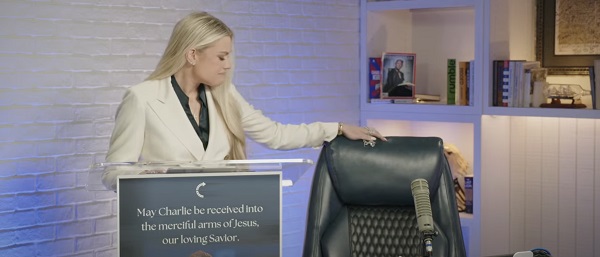
 Daily Caller2 days ago
Daily Caller2 days ago‘You Have No Idea What You Have Unleashed’: Erika Kirk Addresses Supporters For First Time Since Kirk’s Assassination
-

 Censorship Industrial Complex23 hours ago
Censorship Industrial Complex23 hours agoDecision expected soon in case that challenges Alberta’s “safe spaces” law
-
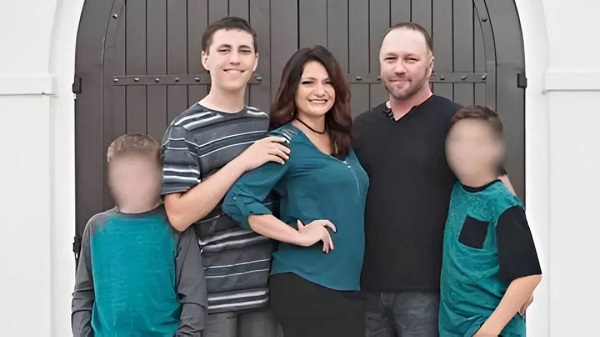
 Crime2 days ago
Crime2 days agoFormer NYPD Inspector Shares What Family Of Alleged Charlie Kirk Assassin Feared Before Turning Him In
-

 COVID-1917 hours ago
COVID-1917 hours agoWhy FDA Was Right To Say No To COVID-19 Vaccines For Healthy Kids
-

 Energy17 hours ago
Energy17 hours agoTrump Admin Torpedoing Biden’s Oil And Gas Crackdown
-

 Education1 day ago
Education1 day agoOur kids are struggling to read. Phonics is the easy fix
-

 International1 day ago
International1 day agoBrazil sentences former President Bolsonaro to 27 years behind bars
